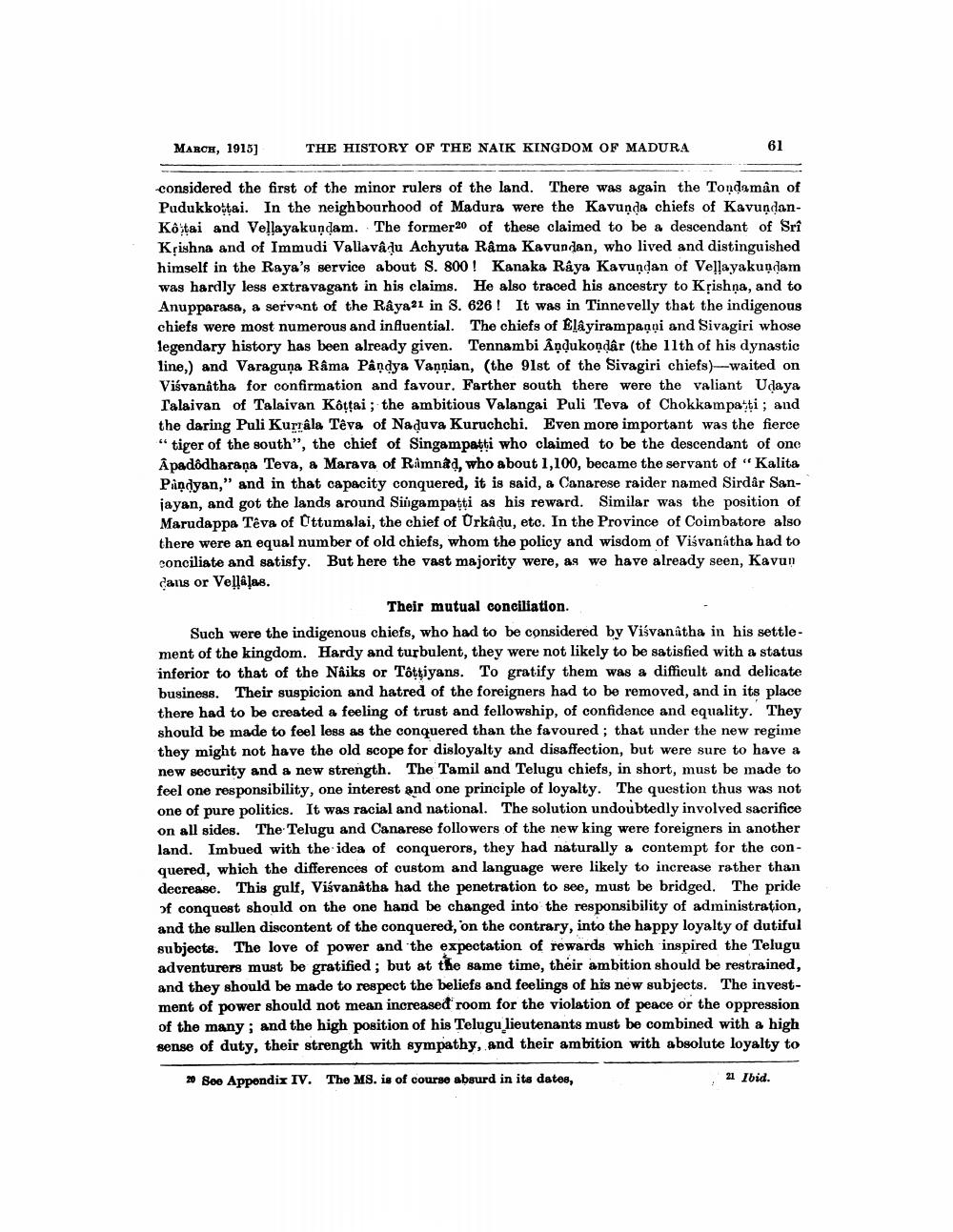________________
MARCH, 1915]
THE HISTORY OF THE NAIK KINGDOM OF MADURA
61
considered the first of the minor rulers of the land. There was again the Tondaman of Pudukkottai. In the neighbourhood of Madura were the Kavunda chiefs of KavundanKô tai and Vellayakuṇḍam. The former20 of these claimed to be a descendant of Srî Krishna and of Immudi Vallavâḍu Achyuta Râma Kavundan, who lived and distinguished himself in the Raya's service about S. 800! Kanaka Raya Kavuṇḍan of Vellayakundam was hardly less extravagant in his claims. He also traced his ancestry to Krishna, and to Anupparasa, a servant of the Râya21 in S. 626! It was in Tinnevelly that the indigenous chiefs were most numerous and influential. The chiefs of Elâyirampangi and Sivagiri whose legendary history has been already given. Tennambi Andukondâr (the 11th of his dynastic line,) and Varaguna Râma Pandya Vannian, (the 91st of the Sivagiri chiefs)-waited on Viśvanatha for confirmation and favour. Farther south there were the valiant Udaya Talaivan of Talaivan Kôṭṭai; the ambitious Valangai Puli Teva of Chokkampatti; and the daring Puli Kurrâla Têva of Naduva Kuruchchi. Even more important was the fierce "tiger of the south", the chief of Singampatti who claimed to be the descendant of one Apadôdharana Teva, a Marava of Râmnad, who about 1,100, became the servant of "Kalita Pandyan," and in that capacity conquered, it is said, a Canarese raider named Sirdar Sanjayan, and got the lands around Singampatti as his reward. Similar was the position of Marudappa Têva of Uttumalai, the chief of Urkâdu, etc. In the Province of Coimbatore also there were an equal number of old chiefs, whom the policy and wisdom of Viśvanatha had to conciliate and satisfy. But here the vast majority were, as we have already seen, Kavun cans or Vellalas.
Their mutual conciliation.
Such were the indigenous chiefs, who had to be considered by Viśvanatha in his settlement of the kingdom. Hardy and turbulent, they were not likely to be satisfied with a status inferior to that of the Nâiks or Tôttiyans. To gratify them was a difficult and delicate business. Their suspicion and hatred of the foreigners had to be removed, and in its place there had to be created a feeling of trust and fellowship, of confidence and equality. They should be made to feel less as the conquered than the favoured; that under the new regime they might not have the old scope for disloyalty and disaffection, but were sure to have a new security and a new strength. The Tamil and Telugu chiefs, in short, must be made to feel one responsibility, one interest and one principle of loyalty. The question thus was not one of pure politics. It was racial and national. The solution undoubtedly involved sacrifice on all sides. The Telugu and Canarese followers of the new king were foreigners in another land. Imbued with the idea of conquerors, they had naturally a contempt for the conquered, which the differences of custom and language were likely to increase rather than decrease. This gulf, Viśvanatha had the penetration to see, must be bridged. The pride of conquest should on the one hand be changed into the responsibility of administration, and the sullen discontent of the conquered, on the contrary, into the happy loyalty of dutiful subjects. The love of power and the expectation of rewards which inspired the Telugu adventurers must be gratified; but at the same time, their ambition should be restrained, and they should be made to respect the beliefs and feelings of his new subjects. The investment of power should not mean increased room for the violation of peace or the oppression of the many; and the high position of his Telugu lieutenants must be combined with a high sense of duty, their strength with sympathy, and their ambition with absolute loyalty to 21 Ibid.
20 See Appendix IV. The MS. is of course absurd in its dates,




